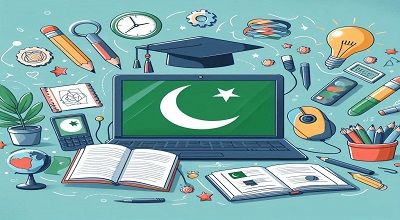Continuing Education In Pakistan
Today I am sharing that Continuing education in Pakistan, often referred to as adult education or lifelong learning, is a system of education and learning opportunities designed for individuals who wish to acquire new skills, enhance their knowledge, or further their education beyond their initial formal schooling. Continuing education programs in Pakistan cater to a diverse range of learners, including working professionals, adults seeking career advancement, and individuals interested in personal development.
Here are some key aspects of continuing education in Pakistan:
- Diverse Offerings: Continuing education programs in Pakistan encompass a wide range of subjects and fields. Including vocational skills, professional development, language courses, IT training, and academic courses.
- Flexibility: These programs are typically designed to accommodate the schedules and needs of adult learners. They often offer flexible class timings, online learning options, and part-time study opportunities.
- Providers: Continuing education programs are offered by various educational institutions, including universities, colleges, technical institutes, and private training centers. Government agencies and non-governmental organizations (NGOs) also play a role in providing adult education services.
- Target Audience: The target audience for continuing education in Pakistan includes individuals. Who may have completed their formal education but want to acquire new skills. Or qualifications, professionals looking to enhance their expertise, and those seeking personal enrichment.
- Certification: Many continuing education programs in Pakistan offer certificates or diplomas upon successful completion of the courses. These certificates can be valuable for career advancement or as proof of skill acquisition.
- Government Initiatives: The government of Pakistan has, at various times, launched initiatives to promote adult and continuing education. Recognizing its importance in enhancing the skills and employability of the workforce.
- Challenges: Despite the importance of continuing education, there are challenges in Pakistan. Such as limited access to quality programs in rural areas. A lack of awareness among potential learners, and financial constraints can hinder participation.
Overall, continuing education in Pakistan serves as a means to bridge the gap between formal education and the evolving demands of the job market. It enables individuals to remain competitive in their careers. Explore new interests, and contribute to personal and national development. However, the availability and quality of these programs can vary widely across different regions of the country. And efforts continue to be made to improve access and relevance.
What are the types of education in Pakistan?
Pakistan’s education system consists of several types of education, catering to different age groups. Levels of study, and educational goals. Here are the primary types of education in Pakistan:
- Pre-Primary Education: This level of education is typically for young children under the age of 5 and includes nursery and kindergarten programs. Pre-primary education is not compulsory but is often considered a foundational stage for children’s development.
- Primary Education: Primary education in Pakistan is for children between the ages of 5 and 10. It covers grades 1 to 5 and is compulsory and free according to the country’s constitution. The curriculum includes subjects like mathematics, science, social studies, and language.
- Middle Education: After completing primary education, students move on to middle school. Which covers grades 6 to 8. This stage builds upon the primary education foundation and introduces more advanced subjects.
- Secondary Education: Secondary education in Pakistan typically encompasses grades 9 to 10 (known as “Matric”). Grades 11 to 12 (known as “Intermediate” or “FSc” for science students and “FA” for arts students). Students usually take board examinations at the end of the Matric and Intermediate stages. This level of education is crucial for higher education and career planning.
Higher Education: Higher education in Pakistan includes various options:
- Undergraduate Programs: These are bachelor’s degree programs offered by universities and colleges. The duration of undergraduate programs varies depending on the field of study and the degree (e.g., Bachelor of Arts, Bachelor of Science).
- Postgraduate Programs: After completing a bachelor’s degree, students can pursue master’s and doctoral programs at universities. This level of education is essential for specialized knowledge and research.
- Technical and Vocational Education: Pakistan also offers technical and vocational education and training (TVET) programs at various institutes. These programs provide skills training for specific trades and professions.
- Professional Education: This type of education is typically pursued after completing a bachelor’s degree. Professional education includes programs in fields such as medicine, engineering, law, business administration, and others. For example, students can pursue a Doctor of Medicine (MD) degree or a Master of Business Administration (MBA) degree.
More Here…
- Religious Education: Pakistan has a significant system of religious education, including madrassas (Islamic religious schools) that offer Quranic education and Islamic studies. Some madrassas also provide a combination of religious and general education.
- Distance and Online Education: With advancements in technology, distance and online education options have become more accessible in Pakistan. Many universities and institutions offer online courses and degree programs, providing flexibility for learners.
- Special Education: Special education programs are designed to meet the needs of students with disabilities. These programs aim to provide tailored support and resources to ensure inclusive education.
- Adult and Continuing Education: As mentioned in a previous response, Pakistan offers adult and continuing education programs to individuals who wish to acquire new skills or further their education beyond formal schooling.
It’s important to note that the quality of education in Pakistan can vary widely, with urban areas generally having better educational infrastructure and resources compared to rural areas. Efforts have been made to improve the education system, including curriculum reforms, teacher training, and initiatives to increase access to education, but challenges persist.
